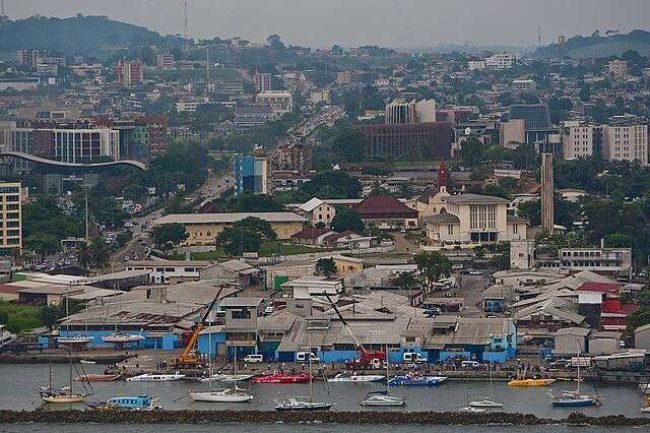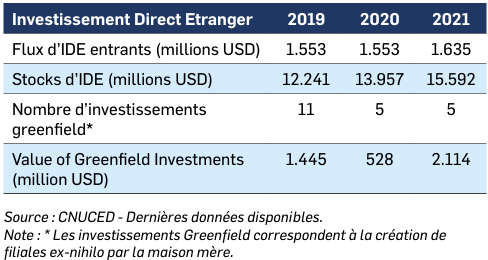Space not available
Reserve this advertising space
Selected ad format
The file format is not recognized
Click here for
upload an ad
Click here to download
an announcement
Here drag and drop or
upload an ad
Send the ad up to 8 days after payment
A link will be sent to you by contact@via-agency.media
Reserved space
Announcement transmitted
Reference
– Towards a growth of 3.1%

According to a team from the International Monetary Fund (IMF), following the first and second combined reviews of the Extended Fund Facility (EFF), Gabon's economic growth, which stagnated at 1.5% in 2021, is expected to accelerate during 2022 to reach 2.8%.
Space not available
Reserve this advertising space
Selected ad format
The file format is not recognized
Click here for
upload an ad
Click here to download
an announcement
Here drag and drop or
upload an ad
Send the ad up to 8 days after payment
A link will be sent to you by contact@via-agency.media
Reserved space
Announcement transmitted
Reference
General framework
Recent macroeconomic developments point to a favorable outlook. Indeed, the AfDB notes that GDP growth rebounded to 1.31t/3t in 2021, after contracting by 1.81t/3t in 2020. This is due in particular to the expansion of the non-oil sector, notably palm oil (1201t/3t) and the timber industry (29.81t/3t).
Unemployment, estimated at 20.51 TYP3T in 2020, remains high, particularly among young people. The budget deficit widened from 2.11 TYP3T in 2020 to 3.41 TYP3T due to an increase in investment spending and current expenditures related to the health crisis. Public debt is estimated at 74.71 TYP3T of GDP in 2021, compared to 77.41 TYP3T in 2020.
In 2021, inflation fell to 1.1% compared to 1.3% in 2020, due to the control of transport and food prices. In March 2022, the BEAC increased its interest rate on tenders from 3.5% to 4% and its marginal lending facility rate from 5.25% to 5.75%, to replenish regional foreign exchange reserves; from 2020 to 2021, these reserves increased from 3 months to 3.6 months of imports. The current account deficit narrowed from 6% in 2020 to 3.5% in 2021, thanks to a stronger increase in exports (31%) than that of imports (9%).
The banking sector's performance in 2021 was supported by prudential measures implemented by the Central African Banking Commission (COBAC) to mitigate the effects of the health crisis on asset quality and bank solvency.
Space not available
Reserve this advertising space
Selected ad format
The file format is not recognized
Click here for
upload an ad
Click here to download
an announcement
Here drag and drop or
upload an ad
Send the ad up to 8 days after payment
A link will be sent to you by contact@via-agency.media
Reserved space
Announcement transmitted
Reference
Macroeconomic outlook
According to the AfDB, the short-term economic growth outlook is favorable. GDP growth is expected to reach 3.31% of GDP in 2022 and 3.41% of GDP in 2023, reflecting a dynamic non-oil sector: agriculture, timber, and mining. With rising oil prices and reforms undertaken under the IMF program, the fiscal balance is expected to gradually improve, resulting in surpluses of 2.31% of GDP in 2022 and 3.41% of GDP in 2023.
Public debt is expected to continue to decline, reaching 70.11% of GDP in 2023. For 2022 and 2023, the Bank forecasts inflationary pressures due to the war in Ukraine, which is expected to mainly affect food and transport prices.
As for inflation, it is expected to reach 2.9% and 2.5% in 2022 and 2023 respectively. The key rates set in March 2022 by the BEAC should ensure internal and external monetary stability.
The current account balance is expected to improve due to the rise in prices of exported raw materials (oil, palm oil, gold, manganese) to reach surpluses of 2.9% in 2022 and 0.7% in 2023. These results are, however, dependent on the implementation of ongoing structural reforms as well as developments in the pandemic and the war in Ukraine.
Climate change and public policy options
In September 2021, Gabon strengthened its climate commitment by adopting a law to combat climate change.
Gabon is one of the countries with the highest carbon sequestration rates in the world. Indeed, since the Rio Earth Summit in 1992, Gabon has absorbed three billion tons of CO2. The country has gone from 0 to 22% of its territory in protected areas and from 0 to 27% of its ocean protected areas. While Africa lost 75% of its forest elephant populations due to poaching, Gabon increased its population by 50% to 95,000 elephants.
Gabon ranks 130th on the 2021 Global Climate Risk Index. It is exposed to rising sea levels, frequent flooding, and coastal erosion, which affect key sectors such as hydropower, agriculture, fisheries, and forestry.
Gabon has a relatively developed political, institutional, and legal framework, integrated into its national development strategy. The country is currently revising its Nationally Determined Contribution (NDC) with the objective of reducing its carbon emissions by 50% by 2025.
The forest covers 88% of its territory and constitutes a carbon reservoir, absorbing four times more CO2 than it emits. The country aims to monetize its carbon credits, estimated at $5 billion in 2021. It also plans to use and monetize flared gas to reduce its dependence on imported finished products and switch to green energy.

Space not available
Reserve this advertising space
Selected ad format
The file format is not recognized
Click here for
upload an ad
Click here to download
an announcement
Here drag and drop or
upload an ad
Send the ad up to 8 days after payment
A link will be sent to you by contact@via-agency.media
Reserved space
Announcement transmitted
Reference







